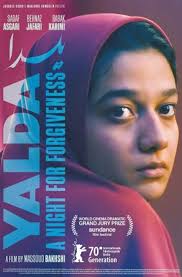
YALDA: A NIGHT FOR FORGIVENESS
Iran, 2019, 89 minutes, Colour.
Sadaf Asgari, Behnaz Jafari, Babak Karimi, Fereshteh Sadre Orafaly.
Directed by Massoud Bakshi.
Iranian films which are exported around the world are frequently very striking, explorations of human values which have surprised many audiences, these films coming from the Islamic Republic with its very strict laws and regulations.
This film is quite surprising. It focuses on forgiveness in Islamic tradition. And, during the 2000s, there was a popular television program where accused people appeared on the television set and are confronted by individuals they have offended because of the crime and who have the power to lead the accused go free. There is a television audience at the studio. There was a wider television audience watching at home – and the collection of money to cover the expenses for the accused.
A young woman, now aged 22, was married young to a man much older than herself, difficulties in the marriage, some violence and her accidentally killing him. While she had a good relationship with the man’s daughter from a previous marriage, this daughter now is demanding justice for the crime. The young woman has been in prison.
The scenes on the set are quite striking, the hard attitude of the daughter, seemingly implacable. And focus on the vulnerability of the young woman and her making her plea and apology. And there is also the razzmatazz of the compere and the atmosphere of the reality show, the behind the scenes with producers, chaperones.
There is an interesting development outside the television set, the daughter upset, going outside, becoming involved in an incident, accidentally, issue of blame and her returning. Then the revelation that the young woman had had a child which was taken away for adoption. And behind the scenes, the very dominating mother of the young woman and the arrival of the adopting couple.
Interesting themes in themselves, especially the reality show and the possibilities for public forgiveness, but very interesting as coming from the Islamic Republic of Iran.
- An audience entry into the culture of Iran, laws and customs, religious society, popular culture, television?
- The title, the custom, the television show, running for 11 years, accused coming onto the show, the discussion with the person possibly forgiving them? The background, laws, murder and executions, reprieves, the forgiveness, the collection for the forgiveness?
- A brief film, a focus on the characters, the characters in themselves and their past, relationships? In public on the television set?
- The focus on Maryam, age 22, the marriage, the older husband, the relationship with Mona? The husband, the relationship, confrontations, the accidental killing? Her arrest, imprisonment, condemnation? The possibility for forgiveness, depending on Mona?
- Maryam and her relationship with her mother, her mother dominant, behind-the-scenes, the birth of the child, the adoption? Her intervening at the station, the demands on her daughter, and the adoptive parents? With the producer, her interventions?
- Mona, the death of her father, the previous relation to marry, her resentment towards Maryam, the behaviour at the television station, listening, thinking, the audience response, the demands, the situation and her not wanting to be there, leaving the studio, outside, the encounters, her return, the voting, the audience response, her stern comments? Her leaving?
- The revelation about the baby, the adoptive parents, Maryam and her wanting the baby, the role of her mother, the producer and the decisions?
- The television company, the host, style, the public audience, the wide viewers, the producer, interventions, other members of the staff, observing, encouraging?
- The experience for Maryam, being prudent, silent, her emotions, her age and inexperience, the influence of her mother, the impact of the child? Her careful answers, imploring Mona? The final decision and its impact on her?
- The revelation about the baby, the adoptive parents, their characters, coming to the studio, demanding to enter, their being allowed in, with Maryam’s mother? The issue of the future of the child?
- Family issues in the Iranian context, Iranian law, and the religious theme of crime, responsibility, atonement, forgiveness?